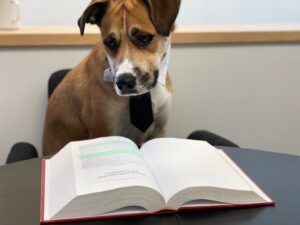Meet Our Furry Friends – Otis, Cedar and Chalupa.
A captivating trio that has captured the hearts of clients, staff and lawyers at Evans Family Law!



Otis, a, well we are not really sure, joined the firm in January 2021. Cedar (aka Lil’ Munch), a beautiful little pug, followed in early April 2021. They welcomed a new friend Chalupa, of unknown heritage, in May, 2023.
These fur babies have become integral members of our team, putting a smile on the faces of clients, staff and lawyers.
Fortunately, each of our beloved mascots reside with both parents. What would happen if Otis’, Cedar’s or Chalupa’s parents were to separate? Would we lose our beloved mascots?
What happens to our family pets if we separate?
While our fur babies, like yours, become cherished members of our family, the court sees our fuzzy companions as personal property. Yup – vacuum, car, painting, puppy…
How Manitoba Courts Determine Ownership
Bill of Sale
Unless there has been an overt act changing ownership, the owner is the person reflected on the bill of sale. Easy enough if there is a bill of sale.
Pre-acquired Pets
No bill of sale? Consider, was she purchased prior to cohabitation? If so, pup is excluded property and leaves with the parent who brought her into the relationship.
Gift
Perhaps she was a gift? The recipient of the gift is entitled to retain the gift following separation. A gift to both of you? Or to the family?
Other Factors
The court may look at several factors including:
- Whether there was an express or implied agreement with respect to ownership, either when the pup first joined the family or later;
- Who purchased or raised her?
- Who was responsible for her care and comfort?
- Who paid for her upkeep?
- Who did she stay with upon separation?
- Did the original owner later gift her to the other parent?
- Any other indications of ownership or agreement that would suggest who has, or ought to have ownership of the pet.
Joint ownership
But, what if, after hearing all the facts, the only reasonable conclusion is that this was a true pet parenting partnership?
Generally, one parent will be ordered to “buy” the interest of the other in the pet, or if there are more than one pet, each parent may retain a pet. The reasoning for avoiding continued shared ownership of the pet is that parents who require the assistance of the court to decide who keeps the pet are more apt to encounter ongoing conflict to address the sharing of time or manner of addressing the costs of care for their pet.
Updated Legislation Regarding Pets in British Columbia
So, the dogs barked, the cats mewed and the legislators took notice – at least in British Columbia where recent amendments to the Family Law Act include factors to be considered by the court when determining the custodial fate of “companion animals”.
No longer are our fur babies mere property! The British Columbia court is now obliged to consider the best interests of the entire family, whether two legged or four, when determining the post separation ownership, and hence residency, of our precious pets.
Factors to be considers by the Court include:
- the circumstances in which the companion animal was acquired;
- the extent to which each spouse cared for the companion animal;
- any history of family violence;
- the risk of family violence;
- a spouse’s cruelty, or threat of cruelty, toward an animal;
- the relationship that a child has with the companion animal;
- the willingness and ability of each spouse to care for the basic needs of the companion animal;
- any other circumstances the court considers relevant.
While the relationship of the child with his fuzzy friend is relevant in the determination of ownership or possession, unlike children the court cannot provide for shared ownership or possession (parenting time) of the companion animal.
Addressing such issues extrajudicially allows the parents of the puppy (or other pet) to craft an agreement best suited to their family, including their four legged children making sharing possible.
Consideration of Pets in Collaborative Law & Mediation
When proceeding collaboratively or participating in mediation, dog parents have the opportunity to discuss arrangements for their cherished pets, deciding where the pet will reside and how costs related to care will be shared. If the pet is part of a family with children, perhaps the pet will travel between homes with the children. Perhaps she will move between homes based upon the work schedules or other commitments of her “parents”.
This approach allows for a resolution crafted by the parties themselves. It’s up to the parents to decide what is best for this important member of the family!
Fortunately for all of us at EPFL and our clients, Otis, Cedar and Chalupa continue to visit our office allowing their extended family of relatives and friends to spoil them!
 By Lori Ainemer
By Lori Ainemer
If you have questions about this post or collaborative law in general, contact me today at lori@epflaw.ca

